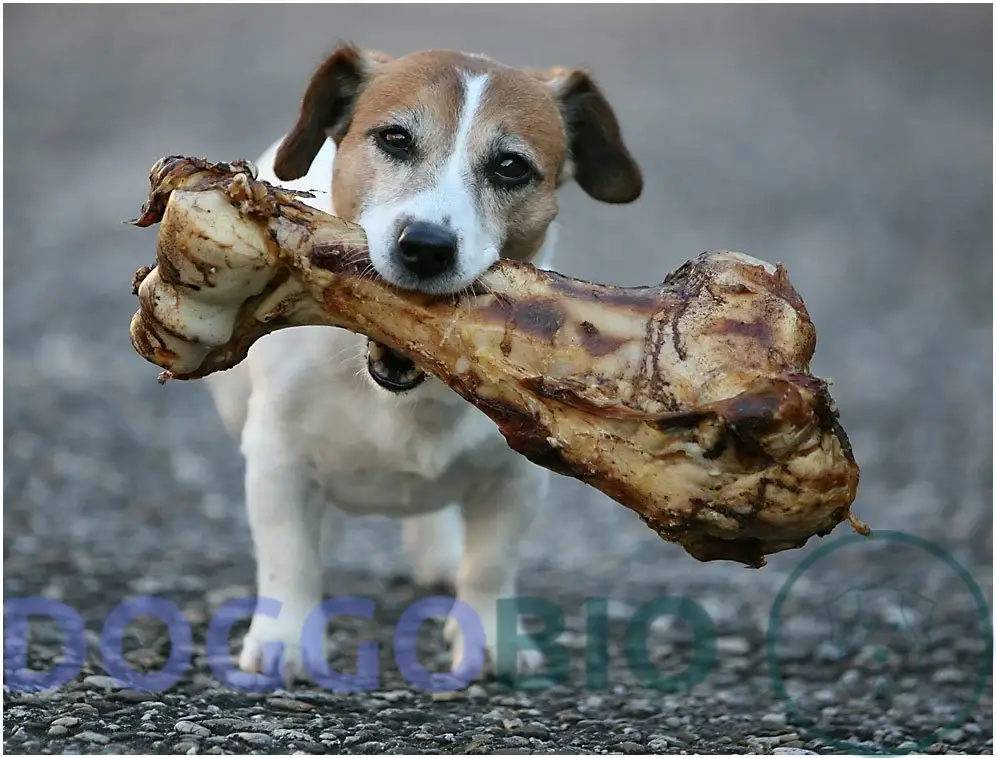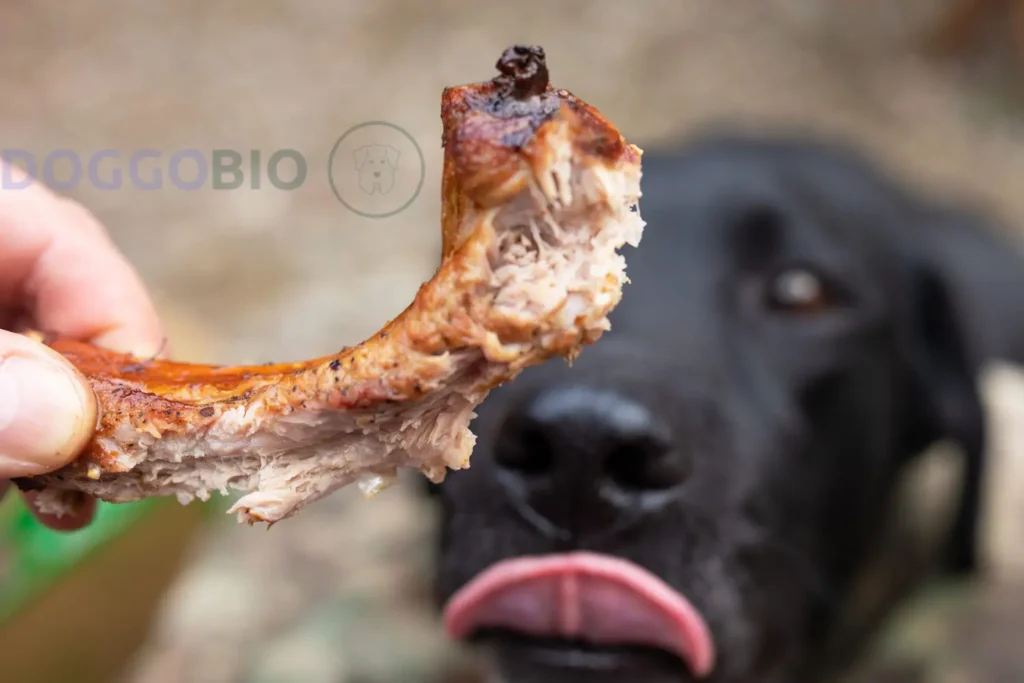As a dog owner, it’s natural to want to share your food with your furry friend. However, not all human foods are safe for dogs to consume.
One of pet owners’ most common questions is, “Can Dogs Have Rib Bones.” The short answer is yes, but there are some essential things to consider before giving your dog rib bones.
In this article, we will explore the topic in-depth and provide you with all the information you need to make an informed decision about feeding rib bones to your dog.
Can Dogs Have Rib Bones?
The question of whether dogs can safely consume ribbons is nuanced. While dogs are naturally inclined to chew on bones, not all bones are created equal regarding safety.
- Rib bones, especially when cooked, can pose significant risks such as splintering, leading to choking, internal injuries, or blockages in the digestive tract.
- Raw rib bones are generally considered safer but have risks, including potential bacterial contamination.
Pet owners must understand these risks and weigh them against the benefits before considering rib bones in their dog’s diet.
Benefits Of Rib Bones For Dogs
Rib bones can offer several benefits when chosen and prepared correctly.
- Chewing on bones can aid dental health by reducing plaque and tartar buildup.
- Bones also provide mental stimulation and can be a source of minerals and nutrients, especially if they contain marrow.
However, these benefits must be balanced against the potential risks. Pet owners should consider their dog’s health and dietary needs when deciding whether to include rib bones.
The Risks Of Giving Dogs Rib Bones
Before we dive into whether dogs can have rib bones, it’s essential to understand the potential risks involved.
While rib bones may seem like a tasty treat for your dog, they can pose serious health hazards.

Here are some of the main risks associated with giving dogs rib bones:
1.Choking Hazard
One of the most significant risks of giving dogs rib bones is the potential for choking. Rib bones can easily splinter and break into small pieces, which can get lodged in your dog’s throat and cause them to stop.
This is especially dangerous for smaller breeds or dogs with underlying health conditions.
2.Intestinal Blockage
Another risk of giving dogs rib bones is the possibility of intestinal blockage. If your dog swallows a large piece of bone, it can get stuck in their digestive tract and cause a blockage. This can be very painful for your dog and may require surgery to remove the blockage.
3.Mouth and Throat Injuries
Rib bones can also cause injuries to your dog’s mouth and throat. The sharp edges of the bones can cut or scratch the inside of your dog’s mouth, tongue, or throat, leading to pain and discomfort. This can also make it difficult for your dog to eat or drink.
4.Bacterial Contamination
Raw or undercooked rib bones can also pose a risk of bacterial contamination. Dogs have different digestive systems than humans, and they may be unable to handle certain bacteria commonly found in raw meat. This can lead to food poisoning and other health issues.
Dental Problems
Giving your dog rib bones can also contribute to dental problems. The intricate texture of the bones can cause wear and tear on your dog’s teeth, leading to chipped or broken teeth, gum disease, and other oral health issues.
How To Safely Give Dogs Rib Bones?
While we’ve established that rib bones can pose risks for dogs, there are some ways to safely give them to your dog if you choose to do so. Here are some tips to remember:

1.Choose Large, Raw Bones
If you give your dog rib bones, ensure they are large and raw. This reduces the risk of choking and intestinal blockage. It’s also important to supervise your dog while chewing on the bone and take it away if it starts to splinter.
2.Limit the Amount of Time Your Dog Chews
Limiting your dog’s time chewing on a rib bone is best. This reduces the risk of dental problems and injuries to their mouth and throat. Once your dog has chewed off all the meat and marrow, it’s time to take the bone away.
3.Discard Bones After a Few Days
Even if your dog hasn’t finished chewing on a rib bone, discarding it after a few days is essential. This helps prevent bacterial contamination and reduces the risk of your dog ingesting harmful bacteria.
Can Dogs Have Cooked Rib Bones?
The answer is no. Dogs should not be given cooked rib bones. Cooking bones changes their structure and makes them more brittle, which increases the risk of splintering and causing harm to your dog.
Additionally, cooked bones can become sharp and pointy, which can cause injuries to your dog’s mouth, throat, and digestive tract. It’s best to avoid giving your dog any type of cooked bone, including rib bones.
Raw vs. Cooked Bones
While cooked bones are off-limits for dogs, some pet owners may wonder if raw bones are safer.
While raw bones may be less likely to splinter, they still pose a risk of bacterial contamination. It’s important to note that even if your dog has a solid immune system, they may still get sick from consuming raw bones.
Another concern with raw bones is the potential for parasites. Natural bones can harbor parasites such as tapeworms, which can cause serious health issues for your dog. If you give your dog raw bones, ensure they come from a reputable source and are properly cleaned and prepared.
When Can We Discontinue The Use Of Rib Bones?
Discontinuing rib bones is advisable if a dog shows signs of dental damage or gastrointestinal issues or becomes possessive or aggressive around bones.
Additionally, if a dog cannot chew the bones safely or the owner cannot supervise the chewing sessions, it may be best to avoid rib bones altogether.
Alternatives To Rib Bones For Dogs
Given the potential risks of giving dogs ribbons, many pet owners may wonder what other options are available. The good news is that there are plenty of safe and healthy alternatives to rib bones for dogs. Here are some ideas to consider:

1.Rawhide Chews
Rawhide chews are a popular alternative to rib bones for dogs. They are made from the inner layer of cow or horse hides and are usually flavored with natural ingredients. Rawhide chews provide a chewing experience similar to that of bones, but they are less likely to splinter and cause harm to your dog.
However, it’s important to note that not all rawhide chews are created equal. Some may contain harmful chemicals or preservatives, so read the label carefully before giving them to your dog.
2.Antlers
Another option for dogs who love to chew is antlers. Deer and elk naturally shed antlers, making them a sustainable and eco-friendly choice. They are also durable and can last long, even for heavy chewers.
However, it’s essential to supervise your dog while they are chewing on an antler to prevent any potential injuries.
3.Dental Chews
Dental chews are a great option if you’re looking to promote good oral health for your dog. These treats help clean your dog’s teeth and freshen their breath. They come in various shapes, sizes, and flavors, making them a tasty and beneficial treat for your furry friend.
Some Posts You Wanna See More
Frequently Asked Questions
Can Puppies Have Rib Bones?
No, puppies should not be given rib bones. Their digestive systems are still developing, and they may be unable to handle the bones properly.
What To Do If My Dog Swallows A Rib Bone?
If your dog swallows a rib bone, monitor them closely for any signs of discomfort or distress. Contact your veterinarian immediately if you notice any symptoms, such as vomiting or difficulty breathing.
Are There Any Benefits To Giving Dogs Rib Bones?
While some potential risks are involved, some pet owners believe that giving their dogs rib bones can help promote good oral health and provide mental stimulation. However, there are safer alternatives available.
Can I Give My Dog Rib Bones From Other Animals?
It’s best to stick to beef or lamb rib bones for dogs. Other types of bones can be more prone to splintering and may contain harmful bacteria.
Are Raw Bones Safe For Dogs?
While raw bones are generally safer than cooked bones, they still carry risks such as bacterial contamination and should be cautiously given.
Can Rib Bones Be Digested?
Some smaller bone fragments can be digested, but larger pieces may cause blockages and should be avoided.
How Do I Know If My Dog Is Suffering From Internal Bleeding?
Symptoms of internal bleeding in dogs include difficulty breathing, pale gums, lethargy, and vomiting. Immediate veterinary attention is required if these symptoms are observed.
What Is The Right Bone Size For My Dog?
The proper bone size for a dog should be large enough to prevent swallowing whole but not so big as to be unmanageable. This varies depending on the dog’s size and breed.
Conclusion
In summary, “Can Dogs Have Rib Bones?” highlights significant health risks for dogs, including choking, intestinal blockage, and internal injury from splintering bones.
Dog owners must understand these dangers and opt for safer chewing alternatives, consulting with veterinarians for guidance. Ultimately, despite the natural inclination to give dogs bones, rib bones are not a safe choice for our canine companions.

I do believe all the ideas youve presented for your post They are really convincing and will certainly work Nonetheless the posts are too short for novices May just you please lengthen them a little from subsequent time Thanks for the post
Pingback: Can Dogs Eat Brisket? Discover Safe And Healthy Diets 2024